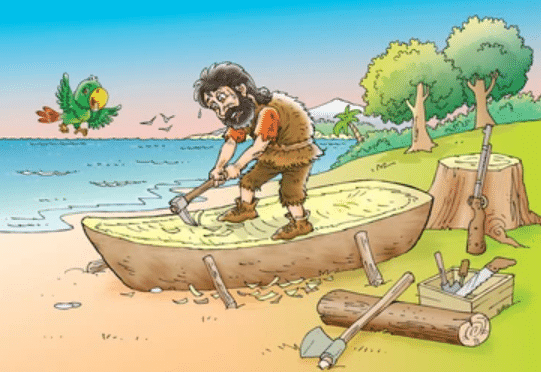Robinson Crusoe Class 5 Notes English Marigold
| Table of contents |

|
| Introduction |

|
| Summary |

|
| Message of the Story |

|
| Difficult Words |

|
Introduction
The story of "Robinson Crusoe," written by Daniel Defoe, is about a man named Robinson Crusoe who ends up alone on a deserted island after his shipwrecks. He is brave and tries to survive using his skills and intelligence. One day, while walking to his boat on the beach, he finds a mysterious human footprint in the sand. This footprint scares and confuses him because he has been living alone on the island for a long time. The footprint makes him realize that he might not be the only person on the island.

Summary
Once upon a time, Robinson Crusoe was walking toward his boat. As he was walking on the sand, he saw something that made him stop and think. There was a footprint! It was a single footprint left by a person, and it surprised him a lot. He looked around but did not see anyone. He listened carefully, but all he could hear was the sound of the waves. The beach was quiet, and he felt very confused.
He was curious about the footprint. He walked up and down the beach, trying to find more footprints. He wanted to know where the person had gone or who had made that footprint. But no matter how much he looked, he only found that one footprint. He went back to look at it again to see if it was real or just his imagination. But it was real! The footprint had clear shapes of toes and a heel. He could not understand how it got there.
After looking at the footprint for a long time, he started to feel scared. He thought about what it could mean. He was all alone on the island, and now he knew someone else had been there. This thought made him feel uneasy. As he walked back home, he felt like someone was watching him. He looked around at every tree and bush, thinking they might be hiding a person. He felt like he was being chased, so he ran to his cave, which he called his castle. He was very frightened and wanted to be safe.
That night, he could not sleep. He kept thinking about the footprint and the person who must have made it. He wondered if it was someone dangerous, maybe a savage from the mainland. He worried that this person might have seen his boat. If they did, they would know he was living on the island and might come back with others to hurt him. This made him very afraid, and he prayed for safety. As he prayed, he felt a little better and decided to be brave and explore the island again.
Even though he felt a bit better, he was still scared. For the next few days, he kept looking around, always glancing over his shoulder. He was careful and wanted to see if there was any sign of the stranger. After a couple of days, he decided to go back to the place where he had found the footprint. He wanted to measure it against his own foot to see how big it was. When he got there, he realized that this footprint was not his. He had not been in that part of the beach for a long time, and the footprint was bigger than his own foot.
At that moment, his fear came rushing back. He now believed that someone else was living on the island. The thought of the island being inhabited by another person made him feel very uneasy. He ran back home, feeling scared and uncertain. The island was not just his anymore; there was someone else there too!
 |
Test: Robinson Crusoe - 4
|
Start Test |
Message of the Story
The main message of this chapter is about fear and the unknown. It explains that feeling scared is normal when we come across something new. Instead of letting fear control us, it's important to try to understand what's causing it. The story of Robinson Crusoe discovering a footprint shows us about human behavior, especially how we often want friends but choose to stay safe when we are in a tough situation.
Difficult Words
- Footprint: The mark left by a foot on the ground.
- Amazed: Very surprised or impressed.
- Confused: Unable to think clearly or understand something.
- Imagined: Created a picture in your mind of something that is not real.
- Chased: Followed quickly in order to catch someone or something.
- Savages: People who live in a wild state, often seen as uncivilized.
- Protection: Keeping someone safe from harm or danger.
- Investigate: To look into something carefully to learn more about it.
- Bold: Showing courage; not afraid to take risks.
- Inhabited: Lived in or occupied by people or animals.
- Realized: Became aware of something or understood it.
- Comforted: Made someone feel better or less sad.
- Examine: To look at something carefully in order to learn more about it.
- Frequent: Happening often or repeatedly.
- Measure: To find out the size, length, or amount of something.
|
22 videos|156 docs|67 tests
|
FAQs on Robinson Crusoe Class 5 Notes English Marigold
| 1. What is the main theme of Robinson Crusoe? |  |
| 2. Who is the main character in the story, and what is his journey? |  |
| 3. What lessons can be learned from Robinson Crusoe's experiences? |  |
| 4. How does Robinson Crusoe change throughout the story? |  |
| 5. What role do adventure and exploration play in Robinson Crusoe? |  |



















